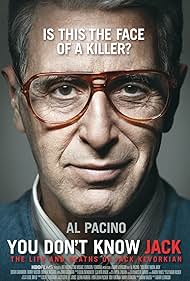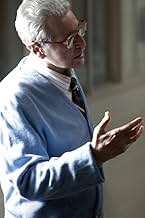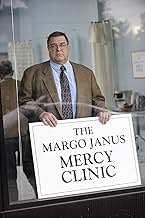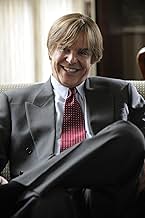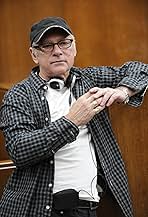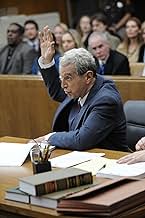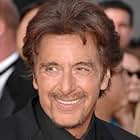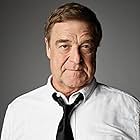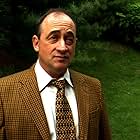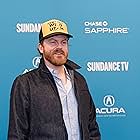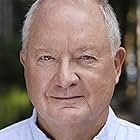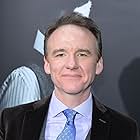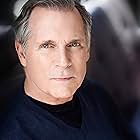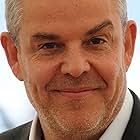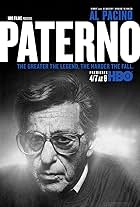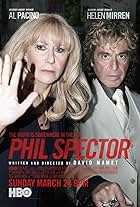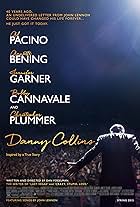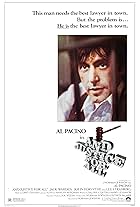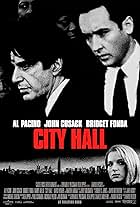A look at the life and work of doctor-assisted suicide advocate Jack Kevorkian.A look at the life and work of doctor-assisted suicide advocate Jack Kevorkian.A look at the life and work of doctor-assisted suicide advocate Jack Kevorkian.
- Won 2 Primetime Emmys
- 11 wins & 38 nominations total
- Director
- Writer
- All cast & crew
- Production, box office & more at IMDbPro
Storyline
Did you know
- TriviaBased on Neal Nicol's and Harry Wylie's novel, "Between the Dying and the Dead: Dr. Jack Kevorkian, the Assisted Suicide Machine and the Battle to Legalize Euthanasia." It was published by Vision in 2006.
- GoofsDr. Kevorkian's original death machine (using IV drugs) was called the Thanatron, not Mercitron. The Mercitron was the name of his carbon monoxide based death machine.
- Quotes
Lynn Mills: Have you no religion? Have you no God?
Jack Kevorkian: Oh, I do, lady, I have a religion, his name is Bach. Johann Sebastian Bach. And at least my God isn't an invented one.
- SoundtracksEarly in the Morning
Written by Dallas Bartley, Leo Hickman & Louis Jordan
Performed by Harry Nilsson
Courtesy of RCA Records
By Arrangement with Sony Music Entertainment
Featured review
If you remember the 90's, Dr. Jack Kevorkian needs no introduction. His name was as much the subject of medical controversy as it was the punchline of countless jokes. His name was as notorious to some as O.J. Simpson or Richard Ramirez, yet also as admirable to others as Bill Clinton or Michael Jordan.
In the hands of many other directors, Kevorkian's biopic could have been treated more like a farce based on the doctor's past eccentricities, such as showing up in court wearing a powdered wig. Of course, Kevorkian's unabashed behaviors in front of camera lenses are depicted in this film, but fortunately, the details of his assisted suicides are not ever given any sugar coated treatments.
"You Don't Know Jack" tells the story about Dr. Kevorkian we should already know. Taking place from approximately 1990-1999, the film takes us from Kevorkian's days of being an unemployed physician to the trial that brought an end to his morally questionable practice for good. The lighting throughout this film is dark and often times dreary, but never dull thanks foremost to an impressive performance by Al Pacino that may be his best since "Scent of a Woman".
When watching this film, there was rarely a moment where I thought to myself, "That's Al Pacino playing Dr. Kevorkian". Pacino's signature eyes and husky voice are still ever present, but he disappears into his role so effectively that I found myself saying, "That is Dr. Kevorkian". Not only is that feat so hard to accomplish for an actor so iconic as Pacino, but it's also hard to play someone who most of the American public knew so well from being on TV all the time.
While it's impressive for Pacino to play the Jack we do know, he plays the Jack many "don't know" with a wry wit that makes an appealing character, even if you don't agree with assisted suicide. A great scene involved Pacino delving a subtle verbal blow to protesters outside his apartment building. When he says that the God he believes in, namely Johann Sebastian Bach, isn't imaginary like the God the protesters believe in, you can't help but laugh. I'm Catholic, and I thought it was hilarious.
However, this movie's strength comes in its nonjudgmental view on Kevorkian's practices. The movie never tells you how you should feel, but also clears up the notion that Kevorkian practiced his assisted suicides with reckless abandon. Many of the suicides in the movie focus on the patients themselves, and their absolute certainty that they want their suffering to end. Of course, leaving their loved ones is their hardest decision, something the film indeed recognizes. Is it still wrong? This movie doesn't tell, nor should it.
What's interesting, though, is the focus on Pacino's eyes during the scene where he performs his first procedure. They move back and forth on the screen as the operation continues, and don't try to mask any emotion of any kind. It could mean that Kevorkian doesn't care about his patients, or that he cares enough about them to keep the procedure as precise as possible. The main point: You decide.
The same is true for Kevorkian's unabashed character on camera. It's all here in this film, but director Barry Levinson resists the temptation for Pacino as Kevorkian to wink and nod at the camera. Considering Levinson directed excellent character-centric comedy/dramas like "Good Morning Vietnam" and "Man of the Year", the temptation must have been there. Fortunately, he used his knack for dramas like "Rainman" and "Avalon" instead, and the effect worked wonders.
The supporting cast behind Pacino is excellent. Danny Huston is fantastic as Geoffrey Fieger, Kevorkian's successful lawyer, and is equally as good interacting with Pacino as he is in the courtroom scenes. Brenda Vaccaro, Susan Sarandon, and John Goodman are great supporting members of this film as colleagues who believe in Kevorkian's mission, but also have the outside vantage point to know what he's inevitably destined for.
Whether you agree with Kevorkian's practices or not, it is impossible not to be compelled by this movie. The story draws you in, the characters are well developed in all the right areas, and it doesn't take more than five minutes for Pacino to convince you he is Dr. Jack Kevorkian. Do you know Jack by the end of this film? I'm still not sure. But I know an excellent movie when I see one, and this deserves 10 stars. See it!
In the hands of many other directors, Kevorkian's biopic could have been treated more like a farce based on the doctor's past eccentricities, such as showing up in court wearing a powdered wig. Of course, Kevorkian's unabashed behaviors in front of camera lenses are depicted in this film, but fortunately, the details of his assisted suicides are not ever given any sugar coated treatments.
"You Don't Know Jack" tells the story about Dr. Kevorkian we should already know. Taking place from approximately 1990-1999, the film takes us from Kevorkian's days of being an unemployed physician to the trial that brought an end to his morally questionable practice for good. The lighting throughout this film is dark and often times dreary, but never dull thanks foremost to an impressive performance by Al Pacino that may be his best since "Scent of a Woman".
When watching this film, there was rarely a moment where I thought to myself, "That's Al Pacino playing Dr. Kevorkian". Pacino's signature eyes and husky voice are still ever present, but he disappears into his role so effectively that I found myself saying, "That is Dr. Kevorkian". Not only is that feat so hard to accomplish for an actor so iconic as Pacino, but it's also hard to play someone who most of the American public knew so well from being on TV all the time.
While it's impressive for Pacino to play the Jack we do know, he plays the Jack many "don't know" with a wry wit that makes an appealing character, even if you don't agree with assisted suicide. A great scene involved Pacino delving a subtle verbal blow to protesters outside his apartment building. When he says that the God he believes in, namely Johann Sebastian Bach, isn't imaginary like the God the protesters believe in, you can't help but laugh. I'm Catholic, and I thought it was hilarious.
However, this movie's strength comes in its nonjudgmental view on Kevorkian's practices. The movie never tells you how you should feel, but also clears up the notion that Kevorkian practiced his assisted suicides with reckless abandon. Many of the suicides in the movie focus on the patients themselves, and their absolute certainty that they want their suffering to end. Of course, leaving their loved ones is their hardest decision, something the film indeed recognizes. Is it still wrong? This movie doesn't tell, nor should it.
What's interesting, though, is the focus on Pacino's eyes during the scene where he performs his first procedure. They move back and forth on the screen as the operation continues, and don't try to mask any emotion of any kind. It could mean that Kevorkian doesn't care about his patients, or that he cares enough about them to keep the procedure as precise as possible. The main point: You decide.
The same is true for Kevorkian's unabashed character on camera. It's all here in this film, but director Barry Levinson resists the temptation for Pacino as Kevorkian to wink and nod at the camera. Considering Levinson directed excellent character-centric comedy/dramas like "Good Morning Vietnam" and "Man of the Year", the temptation must have been there. Fortunately, he used his knack for dramas like "Rainman" and "Avalon" instead, and the effect worked wonders.
The supporting cast behind Pacino is excellent. Danny Huston is fantastic as Geoffrey Fieger, Kevorkian's successful lawyer, and is equally as good interacting with Pacino as he is in the courtroom scenes. Brenda Vaccaro, Susan Sarandon, and John Goodman are great supporting members of this film as colleagues who believe in Kevorkian's mission, but also have the outside vantage point to know what he's inevitably destined for.
Whether you agree with Kevorkian's practices or not, it is impossible not to be compelled by this movie. The story draws you in, the characters are well developed in all the right areas, and it doesn't take more than five minutes for Pacino to convince you he is Dr. Jack Kevorkian. Do you know Jack by the end of this film? I'm still not sure. But I know an excellent movie when I see one, and this deserves 10 stars. See it!
Details
- Release date
- Country of origin
- Official site
- Language
- Also known as
- Untitled Jack Kevorkian Project
- Filming locations
- Production companies
- See more company credits at IMDbPro
Box office
- Budget
- $18,000,000 (estimated)
- Runtime2 hours 14 minutes
- Color
- Sound mix
- Aspect ratio
- 1.78 : 1
- 1.85 : 1
Contribute to this page
Suggest an edit or add missing content

